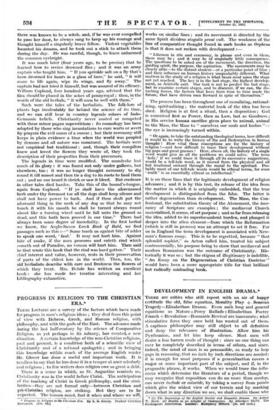PROGRESS IN RELIGION TO THE CHRISTIAN ERA.* - THESE Lectures
are a survey of the factors which have made for progress in men's religious ideas ; they deal from this point of view with Hebrew, Greek, and Roman religion, with philosophy, and with the gods of the East. The advance made during the last half-century by the science of Comparative Religion, as yet perhaps in. its infancy, has created„ a new situation. A certain knowledge of the non-Christian religions, past and present, is a Condition both of a scientific view of Christianity and - of a rational apologetic ; and in bringing this knowledge within reach of the average English reader Mr. Glover has -done a useful and important 'work. It is needless to say that he has done it in a temper at once scholarly . and religious ; to few writers does religion owe so great a debt.
There is a sense in which, as St. Atgustine reminds us, Christianity was in the world before Christ. The. anticipation of the teaching of Christ in Greek philosophy, and the simi- larities—they are not formal only—between Christian and , piC-Christian religion, are striking. But they are to be expected. The human mind, find it when and where we will,
• Progress in Religion to the Chritiias Bra, By L. R. Glover, Student Christian Movement. Lila. Gd.]
works on similar lines ; and its movement is directed by the same Spirit dividens singulis prout vull. The weakness of the line of comparative thought found in such books as- Orpheus is that it does not reckon with development :—
" Likeness in rite and ceremony, in phrase and even in ideas, there may be ; and it may be of singularly little consequence. The questions to be asked are of the movement, the direction, the guiding spirit, the purpose, the aspiration. The sacraments may be closely alike—to the distant student—at a particular point of time ; and their influence on human history unspeakably different. What matters in the study of a religion is what bears most upon the stage not yet reached. The key is in the last stage, the highest develop- ment, as Aristotle said. Our task is not to predict the last stage, but to examine certain stages, and to discover, if' we can, the dis- turbing forces, the factors that have from time to time made the future, that have driven men forward in spite of themselves."
The process has been throughout one of moralizing, rational- izing, spiritualizing ; the material husk of the idea has been shed. Religion is at first a ritual, then a disposition ; God is conceived first as Power, then as Law, last as Goodness ; in His service human sacrifice gives place to animal, animal
to the Mass, the Mass to " ourselves our souls and bodies "- the eye is increasingly turned within.
" Or again, to take the outstanding theological terms, how difficult it would be to write the history of Sin and Redemption in human thought ! How vital these conceptions are for the history of religion !—and how difficult to trace their development without big gaps and great guesses ! Here, above all, the history of a single word would give us all the problems we could solve. The term
holy,' if we could trace it through all its successive suggestions, would be a tell-tale word, as it moved from the physical and all but irrational onward through the moral to the spiritual. Pro- bably most of our tell-tale words would be ethical terms, for even truth' is as essentially ethical as intellectual."
It is on these lines that the legitimate development of religion advances ; and it is by this test, its release of the idea from the matter in which it is originally embedded, that the true
development is distinguished from the false. The latter is rather degeneration than development. The Mass, the Con- fessional, the substitution theory of the Atonement, the iner- rancy of Scripture are examples ; the mediaeval Church materialized, it seems, of set purpose-; and so far from releasing the idea, added to its superincumbent burden, and plunged it deeper into the alien element—from which the Reformation (which is still in process) was an attempt to set it free. For us in England the-term development is associated with New- man's famous essay. This is to be regretted, because " that splendid sophist," as Acton called him, treated his subject controversially, his purpose being to show that mediaeval and modern Romanism was the outcome of Christianity. His- torically it was so ; but the stigma of illegitimacy is indelible,
" An Essay on the Degeneration of Christian Doctrine " would have been a more appropriate title for that brilliant but radically misleading book.


































































 Previous page
Previous page